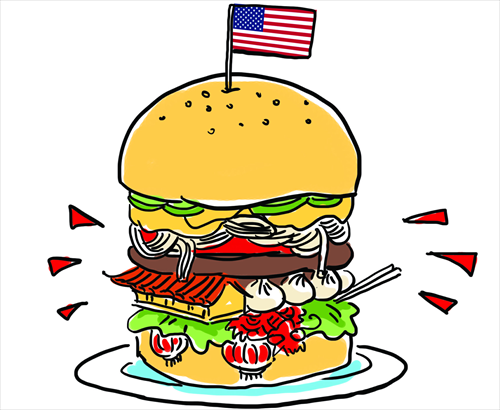Don’t group ‘Asian Americans’ together

Illustration: Liu Rui/GT
From government reports to the news media and popular entertainment, the term "Asian American" is often shorthand for all Americans of Asian descent. Unfortunately, this term is at best unhelpful and at worst promotes harmful and even racist attitudes regarding those it is used to define.
"Asian American" is so broad as to be essentially useless for the vast majority of purposes. After all, the term Asian American includes the descendants of Chinese immigrants who entered the US before the various exclusion acts of the 19th century, the Vietnamese refugees from fall of South Vietnam, Cambodians, and a whole constellation of nationalities and cultures. In many cases, this category is applied to individuals who share no common culture, language or nationality.
The first problem regarding this terminology is practical, as it is extremely difficult to effectively analyze such a diverse social group. While Asian Americans are commonly seen as America's "model minority," the fact is that specific subgroups often diverge from that image. For example, Hmong-Americans suffer from poor access to good educational services and face higher than normal levels of poverty. And yet this fact is often lost as these groups find themselves submerged in America's largely invented image of the "typical" Asian Americans.
This makes addressing specific issues with America's citizens of Asian descent rather difficult. The challenges confronting a first-generation Chinese-American family will not be the same as those confronting a Japanese-American family that has lived in the US since before WWII. In all of these cases, the ethnic group in question will be far more impacted by their actual national origin and culture, rather than some mythical characterization as Asian Americans, as if that vast region was a single unified group.
The second issue is how this impacts many Americans' view of their fellow citizens. Many Americans who proudly identify themselves as Italian or German-American do not seem to realize that the same courtesy should be applied to their Chinese-American and Cambodian-American neighbors. To a great extent, this is due to the long history of racial prejudice on the part of America when it came to thinking about Asian nations. To be blunt, for much of US history, few Americans bothered to think of Asia as anything other than one rather amorphous group of threatening foreigners. While those attitudes are no longer dominant, they have still left a legacy of seeing Asia and Asians as a culturally homogeneous group, rather than a collection of dynamic and widely varying nations and peoples.
Unfortunately, this can often lead to Americans falling into the trap of seeing their neighbors through the flawed lens of the "model minority" stereotype and even worse, judging them by that false standard. It is hard enough to face economic trouble in the US, without the neighbors verbally wondering why you have "fallen short" of some mythical standard about your group. This has also led to unwarranted feelings of jealousy and alienation from the community, all of which can be blamed upon this focus on the "Asian-American" identity, rather than accepting that the reality is far more complex. Additionally, it empowers those racists who target "Asian Americans" as somehow dangerous to the US due to their perceived success and their national origin.
Some argue that no allowances for a group's national origin should be made, that a hyphenated identity is in and of itself harmful. This attitude is both hypocritical and harmful to the US.
The fact is that the people who have become part of the US have always brought their identity with them, and there have always been those who fear that fact. And yet today the descendants of the Italians and Eastern Europeans, who were once seen as a deadly threat to the US, have not only kept their legacy, but that legacy has gone on to enrich the larger American culture.
The diverse Asian community will do the same, bringing the heritage of their home nations and sharing it with their new neighbors in the US. But to do so effectively, we must realize that these individuals are not from a mythical "Asia," which has more to do with US' attitudes than it does any real historical basis, but are from China, Japan, Vietnam, and many other nations, all with their own unique history and culture that can help to enrich the US, just as every other immigrant community has enriched the US.
The author is a freelance writer based in Corona, California. charlesgray109@gmail.com Follow us on Twitter @GTopinion